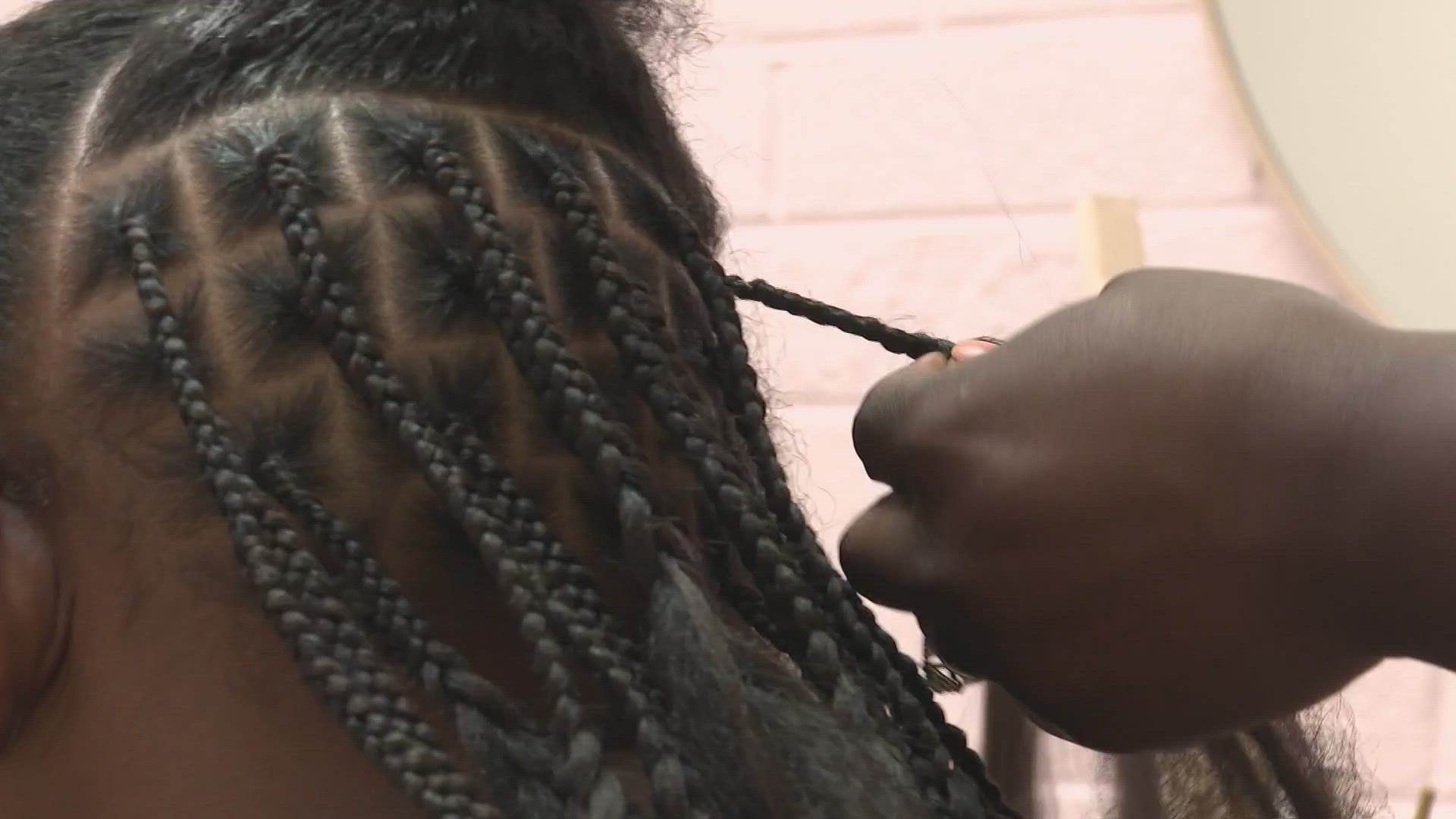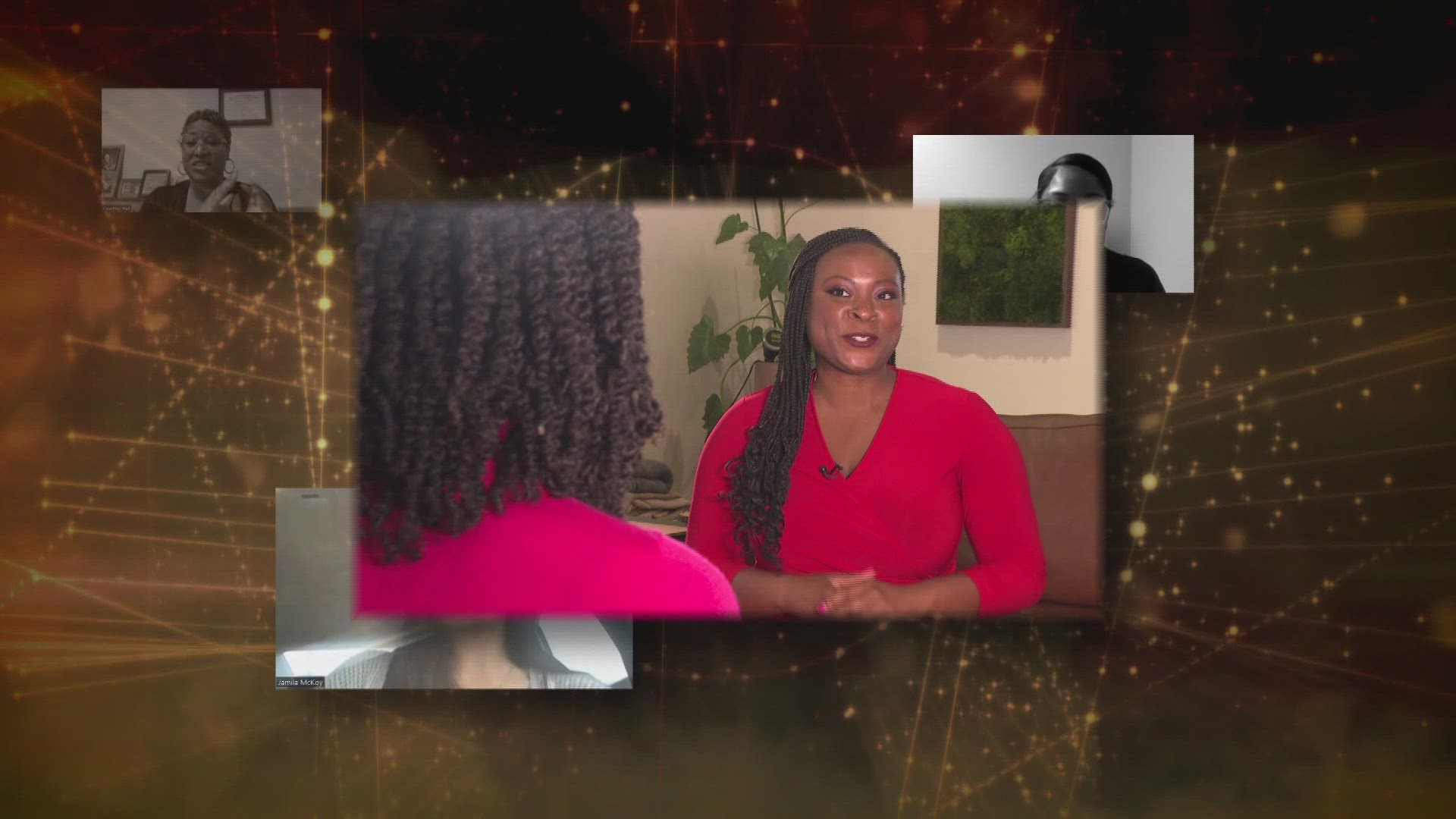GREENSBORO, N.C. —
Braids, extensions, twists, and locs—traditional Black hairstyles. While more women of color are embracing their natural texture, their place in the professional space remains a point of contention.
According to a 2023 Workplace Research Study, Black women's hair is more likely to be perceived as unprofessional. Nearly half of Black women under age 34 feel pressured to have a headshot with straight hair.
I can relate. As an on-air news personality, for so long I felt I was limited in the types of styles I could wear on-air. I remember as an intern being told by mentors, even some who looked like me, "Your braids are beautiful, but they won't do for your resume reel."
For nearly eight years, I wore my hair under straight wigs. Last October, I wore my hair in braids for the first time on television. After posting about my braids on Facebook, I received thousands of likes and hundreds of shares. Comments from women who shared similar experiences in different lines of work.


Yet, why is Black hair and professionalism so intertwined? Let's begin at the hair salon.
Jaime Wright is the owner of Curley Girl Coach Salon in Greensboro. She said 90% of her clientele has naturally curly or naturally textured hair.
“I've had clients tell me that they have been told their hair is unprofessional, it was big, it was frizzy and encourage them to make it a little bit smaller and a little more manageable so they could be more palatable to audiences," Wright said.
No matter the style, Wright said health and comfort should be top of mind.
“Firstly, is it a healthy option for you?” Wright said. “And secondly, does the choice make you happy? Does it make sense for your lifestyle? Those are the only things that should be considered when deciding how to wear your hair.
Finding a style that fits her schedule with work and kids, is what spurred Jeanine Sipp's haircare journey. She's worked for corporate companies her entire career.
“My hair journey started with straight hair, eventually I did the big chop, cut it all off,” Sipp said. “I had a very short, cropped hairstyle that was natural. Over time, as the hair grew, I took on different styles and the most common style that I would wear is a puff. Essentially, just pulled up curly hair.”
Sipp recently transitioned to a remote role. During this time, she's experimented with different styles like braids and two-strand twists. I asked her why she felt more comfortable embracing these different styles.
“A lot of it has to do with the questions,” Sipp said. “If you change your hair this week to next week. It's a topic. It's, is that your hair? Can I touch it? How did you do that? Can you wash it? Like so many pretty personal questions that it's just easier in a lot of ways to just pick your style. It kind of became my signature."
A 2019 research study for women found that Black women are 80% more likely to change their natural hair to meet social norms or expectations at work. Sipp said that percentage doesn't surprise her.
“I think because if you're not represented there a lot, if there's not a lot of us, there isn't a norm,” Sipp said “So, the norm is not the styles I would typically wear. People with my textured hair would wear. So, if you have something different about you, it's a topic."
Racial discrimination based on hairstyles doesn't just impact women. Atiba Berkley, President of the Piedmont Blues Preservation Society, said it was hair discrimination that made him switch careers.
“I moved to the South as a restaurant manager and my hair held me back from potential growth which is something I never experienced and wasn't willing to deal with,” Berkley said. “I definitely had a national chain restaurant not offer me a job because they told me I needed to cut my hair.”
Berkely who wears his hair in locs said it wasn’t a good feeling.
“I was hurt and frustrated and a part of me kind of expected it, part of it might have been validating in a way because I hadn't experienced it so strongly directly prior to that,” Berkley said. “Growing up my family would always say, you know this is a possibility for people who have hair like this."
Work is being done to help make sure stories like this don't happen again. Some cities and counties in North Carolina have laws banning race-based discrimination. This includes Greensboro, Charlotte, and Winston-Salem. A statewide ban could be on the way. The Crown Act was first introduced in Raleigh back in February.
Dr. Jeannette Wade is an associate professor of sociology at North Carolina A&T State University. Her areas of expertise include Race and Gender studies.
“One might argue, well your hair is distracting, it makes it harder in the workplace, can't you just tie it back, or straighten it, pen it up?” Dr. Wade said. “But when we talk about it in terms of racism whereby these hairstyles are associated with one race group and now it's not ok to tell that race how to wear their hair, I think people will take it more seriously."
Dr. Wade said not only legislation but education and awareness are key.
“A lot of legislation has been put in place, but hearts and minds have to change,” Dr. Wade said. “What you're doing right now, running a story like this, I think is amazing because hearts and minds change when conversations happen.”
I will continue to share the stories of others with the hopes all hair will be accepted in any place or space. I asked my interview subjects the following questions, “What does hair mean to you?”
Jeanine Sipp: “I love it. It’s a way to express yourself. It’s a mood depending on how you feel that day.”
Jaime Wright: “For me, hair means beauty. It means transformation.”
Dr. Jeanette Wade: “It means image, it means culture, it means history.”
Atiba Berkley: “Your hair can be beautiful as it is, my hair can be beautiful as it is, and they can both be ok. Everything isn’t for everybody. So, if it ain’t on your body, what do you care?"
Since 2019, 20 states have passed legislation to prevent discrimination based on hair texture and style.


